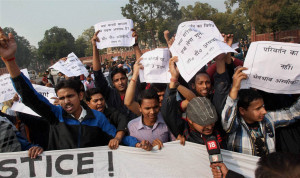JEE Advanced 2014 Result Analysis Not in Favor of Regional Languages
At a time when all hell has broken loose – inside and outside the Parliament – to demand that the Union Public Service Commission (UPSC) should conduct the civil services exams in all the Indian languages, the results of the a recent experiment with the largest engineering entrance examination in India show that the move does not do much to improve the performance of the students that it intends to benefit.
JEE Main 2014, which is the biggest all-India engineering test in the country, was conducted by the Central Board of Secondary Education (CBSE) in Marathi and Urdu too this year. Only a handful of students chose the new language options – and those who did could not perform well. Only 23 candidates, out of 758 Marathi-medium students qualified for JEE Advanced. Similarly, only 2 students, out of 300 Urdu-medium students, made it to the list of JEE Advanced qualifiers.
Till 2012, all-India engineering entrance examination – then known as IIT JEE – was conducted only in English and Hindi. Last year, when JEE Main was introduced, Gujarat decided to accept its scores for admission to state-level engineering colleges too and scrapped its state-engineering entrance exam on the condition that students of the state are able to take the exam in Gujarati too.
This year, Odisha, Maharashtra and Uttarakhand joined the JEE system. Maharashtra demanded that its students should be allowed to appear for the engineering exam in Marathi and Urdu too – languages allowed in its state-level test. It is expected that as the states keep joining the JEE Main exam, more and more regional languages will be added to the list of available options.
Experts argue that it might not be fair for Marathi-medium or Urdu-medium students to judge them by their ability to make it to the IITs as they might be competing only for the seats in state engineering colleges. But the fact remains that in face of the recent agitation against English in the civil services exam, these findings are quite significant.
JEE Main 2014 result analysis comes with many insights relevant for the UPSC Civil Services Examination row, such as:
- A senior CBSE official shared that most students who took JEE Main in Marathi and Urdu were from government schools and poor families. Their poor performance and weak success rate can be attributed to lack of coaching and guidance too. Most of the JEE coaching is either available in English or in Hindi (in some regions), is expensive and is concentrated in urban areas.
State governments offer IAS coaching (for civil services exam) in regional languages for free but private IAS coaching institutes in urban areas mostly teach in English.
An IIT faculty member opines that even the JEE Main aspirants taking exams in regional languages can have a better success rate of they have adequate study material and training in the languages they choose. This trend can be seen in the case of Gujarat where even students from well-off families study in Gujarati medium. Hence, the success rate of students who took JEE Main in Gujarati is quite high.
- Science education – at Class XII level – is mostly preferred in English. Hence, it is natural that engineering aspirants must have a grasp over the language. Regional languages do not do them much good at later stages.
Civil services exam, however, does not test only science students. It is mainly a test of Humanities, which can easily be taught well in Indian languages and hence, civil service aspirants may perform better if they are allowed to take exams in the languages they are comfortable with.
Former Vice-Chancellor of the Central University of Bihar, Janak Pandey, pointed out, “These days when parents in rural areas too are admitting their students in English-medium schools, call from MPs to introduce regional languages in competitive exams may be against the drift of the times.â€Â
- Excited
- Fascinated
- Amused
- Bored
- Sad
- Angry







